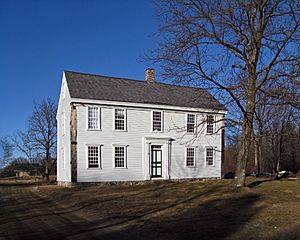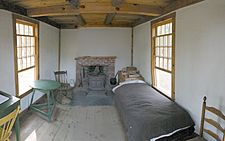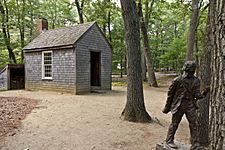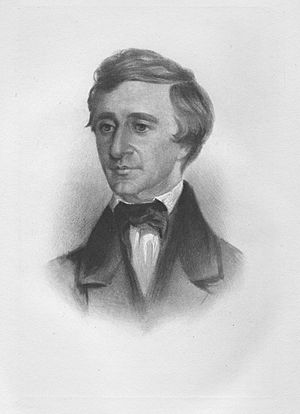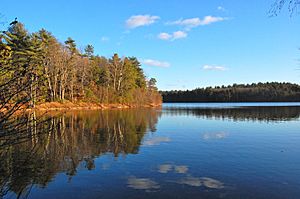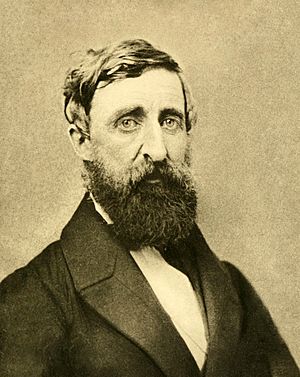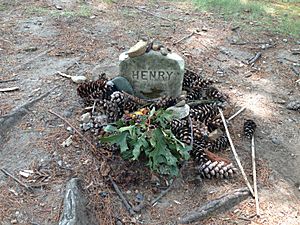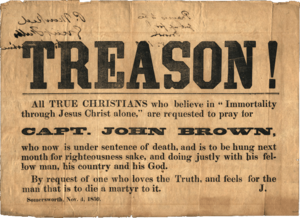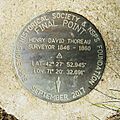Henry David Thoreau facts for kids
Quick facts for kids
Henry David Thoreau
|
|
|---|---|
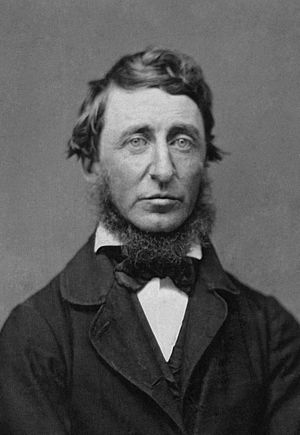
Thoreau in 1856
|
|
| Born |
David Henry Thoreau
July 12, 1817 Concord, Massachusetts, U.S.
|
| Died | May 6, 1862 (aged 44) Concord, Massachusetts, U.S.
|
| Alma mater | Harvard College |
| Era | 19th-century philosophy |
| Region | Western philosophy |
| School | Transcendentalism |
|
Main interests
|
|
|
Notable ideas
|
|
|
Influenced
|
|
| Signature | |
Henry David Thoreau (born July 12, 1817 – died May 6, 1862) was an American writer, naturalist, and philosopher. He is famous for his ideas on simple living and his strong belief in individual freedom. Thoreau is best known for his book Walden, which shares his experiences living close to nature. He also wrote the essay "Civil Disobedience", which argues that people should not obey unfair laws.
Thoreau was a leading figure in a movement called Transcendentalism. This idea suggested that people can find truth and understanding through their own intuition and nature, not just through rules or traditions. His writings often combined observations of nature with deep thoughts about life and society.
He was also a strong supporter of ending slavery. He spoke out against unfair laws, like those that forced escaped enslaved people back to their owners. Thoreau's ideas about civil disobedience later inspired important leaders like Mahatma Gandhi and Martin Luther King Jr.. They used his ideas to fight for justice in a peaceful way.
Contents
Henry David Thoreau's Life Story
Early Life and School, 1817–1837
Henry David Thoreau was born in Concord, Massachusetts. His birth name was David Henry Thoreau. His father, John Thoreau, was a pencil maker. His mother was Cynthia Dunbar. Henry was named after his uncle, David Thoreau, who had recently passed away. He started calling himself Henry David after he finished college.
He had two older siblings, Helen and John Jr., and a younger sister, Sophia Thoreau. None of the children ever married. Sadly, all of them, including Henry, died from tuberculosis.
Henry went to Harvard College from 1833 to 1837. He studied many subjects like writing, philosophy, and science. A famous story says he refused to pay a five-dollar fee for his master's diploma. He believed the diploma was not worth the money. He famously said, "Let every sheep keep its own skin," meaning he didn't need a fancy piece of paper to prove his worth.
Thoreau's birthplace, the Wheeler-Minot Farmhouse, is still in Concord. It has been restored and is now open for people to visit.
Returning to Concord, 1837–1844
After college, Thoreau wasn't interested in common jobs like law or medicine. In 1837, he taught at the Concord public school. But he quit after a few weeks because he didn't want to use physical punishment on students.
Then, he and his brother John opened their own school, the Concord Academy, in 1838. They had new ideas for teaching, like taking students on nature walks. The school closed when John became very sick and passed away in 1842.
Back in Concord, Thoreau met Ralph Waldo Emerson, a famous writer and thinker. Emerson became a mentor to Thoreau. He introduced him to other writers and philosophers in the area. These included Margaret Fuller and Nathaniel Hawthorne.
Emerson encouraged Thoreau to write for a magazine called The Dial. Thoreau's first essay was published there in 1840. He also started keeping a detailed journal, which Emerson had suggested. His first journal entry was on October 22, 1837.
Thoreau was a philosopher who thought deeply about nature and how it connects to human life. He followed Transcendentalism, a philosophy that believed in finding truth through personal feelings and nature. They thought nature was a way to see the "inward spirit."
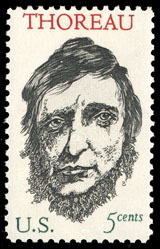
From 1841 to 1844, Thoreau lived with the Emersons. He helped tutor their children and assisted Emerson with his work. For a short time in 1843, he lived in New York to try and get his writings published.
Thoreau later returned to Concord and worked in his family's pencil factory. He found a way to make good pencils using clay as a binder. This helped the family business. He also converted the factory to make graphite for a process called electrotyping.
In April 1844, Thoreau and a friend accidentally started a fire. It burned about 300 acres of Walden Woods.
Living at Walden Pond, 1845–1850
Thoreau wanted to focus more on his writing. So, on July 4, 1845, he began an experiment in simple living. He built a small house on land owned by Emerson near Walden Pond. The house was about 1.5 miles from his family home. He lived there for two years, two months, and two days.
While living at Walden, he wrote about his experiences. He also completed a first draft of A Week on the Concord and Merrimack Rivers. This book was a tribute to his brother John. He paid to publish 1,000 copies himself, but not many were sold.
In July 1846, Thoreau was asked by the local tax collector to pay six years of unpaid poll taxes. Thoreau refused to pay. He did this because he was against the Mexican–American War and slavery. He spent one night in jail for his refusal. The next day, someone, probably his aunt, paid the tax for him.
This experience greatly affected Thoreau. He later gave lectures about his tax resistance. He then wrote an essay called "Resistance to Civil Government" (also known as "Civil Disobedience"). It was published in 1849. In this essay, he argued that people have a duty to disobey unfair laws.
Thoreau left Walden Pond on September 6, 1847. He moved back to Emerson's house to help Emerson's wife while Emerson was traveling. Over several years, he worked to pay off his debts. He also kept revising the manuscript of his book, Walden, or Life in the Woods. It was finally published in 1854. The book describes his time at Walden Pond. It uses the four seasons to show how people grow and change.
Walden was not very popular at first. But over time, it became a classic American book. It explores ideas of natural simplicity, harmony, and beauty. It suggests these can be models for a fair society. The poet Robert Frost said of Walden, "In one book ... he surpasses everything we have had in America."
Later Years and Nature Studies, 1851–1862
After 1851, Thoreau became very interested in natural history. He read many books about plants and animals. He also admired the works of Charles Darwin. Thoreau kept detailed notes in his journal about nature in Concord. He recorded things like when fruits ripened and how birds migrated. He wanted to understand the patterns of nature.
He became a land surveyor. He continued to write detailed observations about the natural history of his town. His journal grew to two million words over 24 years. These observations became the basis for his later writings on nature. These included essays like "Autumnal Tints" and "Wild Apples."
Thoreau's studies of nature were very advanced for his time. For example, in his lecture "The Succession of Forest Trees," he explained how forests grow back after fires or human destruction. He observed that squirrels often bury nuts far from the trees. These nuts can then grow into new trees. He saw this as a "great service ... in the economy of the universe."
Thoreau traveled to Canada, Cape Cod, and Maine. These trips inspired his "excursion" books. These books combined travel stories with his thoughts on geography, history, and philosophy. He also read many accounts of explorers traveling to distant lands. He learned about different cultures and the natural world. He famously advised people to "live at home like a traveler." This meant to explore and learn about your own surroundings as if you were visiting a new place.
After John Brown's raid on Harpers Ferry, many people in the abolitionist movement criticized Brown. Thoreau was upset by this. He gave a powerful speech called A Plea for Captain John Brown. In it, he strongly defended Brown and his actions. Thoreau's speech helped change how people viewed John Brown. He became seen as a hero for the abolitionist cause.
Death
Thoreau had tuberculosis since 1835. His health got worse over time. In 1860, he became very ill after counting tree rings in a rainstorm. He spent his last years revising his unpublished works. He also tried to get his books A Week and Walden reprinted.
His friends noticed how calm he was about dying. When his aunt asked if he had made peace with God, Thoreau replied, "I did not know we had ever quarreled."
Thoreau's last words were "Now comes good sailing," followed by "moose" and "Indian." He passed away on May 6, 1862, at age 44. His friend Emerson gave the eulogy at his funeral. Thoreau was buried in Sleepy Hollow Cemetery in Concord, Massachusetts.
Thoreau's Ideas and Beliefs
Nature and Human Life
Thoreau believed in protecting nature. He was an early supporter of hiking and canoeing. He also thought that natural areas should be preserved as public land. He was a skilled canoeist. Nathaniel Hawthorne once said that Thoreau managed his boat so perfectly it seemed to move by his own will.
He was not a strict vegetarian, but he preferred to eat plant-based foods. He wrote in Walden that eating fish "cost more than it came to." He felt that simple foods like bread or potatoes were enough.
Thoreau did not completely reject civilization or fully embrace wilderness. He looked for a balance between nature and human culture. He wanted to teach people about the importance of the wild. He enjoyed exploring nearby swamps and forests. He also hiked in untouched areas. He believed that spending time in nature helped people appreciate civilization more.
Politics and Government
Thoreau was strongly against slavery. He actively supported the movement to end it. He even helped people escape slavery through the Underground Railroad. He gave speeches criticizing the Fugitive Slave Law. He also supported John Brown, a radical abolitionist leader, even when many others did not.
In his essay The Last Days of John Brown, Thoreau praised John Brown's actions as noble and heroic. He was disappointed that newspapers called Brown "crazy."
Thoreau believed in limited government and individualism. He hoped that people could eventually have a government that "governs not at all." But he also said, "I ask for, not at once no government, but at once a better government." He thought that a truly free society would recognize each person as a powerful and independent being.
He also believed that people should resist unfair authority. This resistance could be peaceful, like his tax resistance. But he also supported violent resistance, as seen in his support for John Brown. He felt that peace should not come from being too weak to fight.
Thoreau was against the Mexican–American War. He saw it as an unfair war to expand slave territory. He also supported protecting animals and wild places. He believed in free trade and using taxes for schools and roads. He was against the mistreatment of Native Americans, slavery, and too much focus on material things. He also disliked how technology was sometimes used for silly purposes.
Influences and Interests
Indian Philosophy
Thoreau was influenced by Indian spiritual thought. In Walden, he often mentioned sacred texts from India. For example, he wrote, "How much more admirable the Bhagvat-Geeta than all the ruins of the East!" He saw God as connected to the world, which is a common idea in Hinduism.
He also followed some Hindu customs. These included eating mostly rice and playing the flute, which is linked to the Hindu god Krishna.
Biology
Thoreau read many books about the new science of biology. He was influenced by scientists like Alexander von Humboldt and Charles Darwin. In 1859, Thoreau bought and read Darwin's famous book, On the Origin of Species.
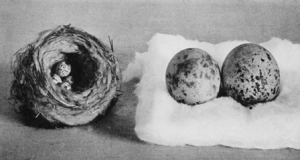
Thoreau's Impact
Thoreau's political writings were not very well-known during his lifetime. People saw him more as a naturalist. His political essays, like Civil Disobedience, were often ignored. But after his death, extracts from his journal were published. This led to a growing interest in his work.
Thoreau's writings later influenced many important people. Leaders like Mahatma Gandhi, U.S. President John F. Kennedy, and Martin Luther King Jr. were deeply affected by his work, especially Civil Disobedience. Leo Tolstoy, a Russian author, was also influenced by Thoreau.
Gandhi first read Walden in 1906. He later read Civil Disobedience while in prison in South Africa. He said Thoreau's ideas were "unanswerable." Gandhi even said he took the name of his movement, "Civil Disobedience," from Thoreau's essay.
Martin Luther King Jr. wrote that he first learned about nonviolent resistance from reading "On Civil Disobedience" in 1944.
Thoreau also influenced many artists and authors, including Marcel Proust and Ernest Hemingway. Naturalists like John Muir and E. O. Wilson also found inspiration in his writings.
The American psychologist B. F. Skinner carried a copy of Walden when he was young. In 1945, he wrote Walden Two, a fictional story about a community inspired by Thoreau's life.
For the 200th anniversary of his birth in 2017, new editions of his work were released. The United States Postal Service also issued a special stamp honoring Thoreau.
Thoreau's ideas have also influenced the anarchist movement. Emma Goldman called him "the greatest American anarchist." His ideas have inspired Green anarchism and other movements that focus on nature and individual freedom.
Selected Works
Many of Thoreau's writings were published after he passed away.
- A Week on the Concord and Merrimack Rivers (1849)
- Resistance to Civil Government (1849)
- Walden (1854)
- A Plea for Captain John Brown (1859)
- Walking (1862)
- Autumnal Tints (1862)
- Wild Apples: The History of the Apple Tree (1862)
- Excursions (1863)
- Life Without Principle (1863)
- The Maine Woods (1864)
- Cape Cod (1865)
- A Yankee in Canada, with Anti-Slavery and Reform Papers (1866)
- Journal of Henry David Thoreau (1906)
Images for kids
See also
 In Spanish: Henry David Thoreau para niños
In Spanish: Henry David Thoreau para niños
- American philosophy
- List of American philosophers
- List of peace activists
- Thoreau Society
- Walden Woods Project


